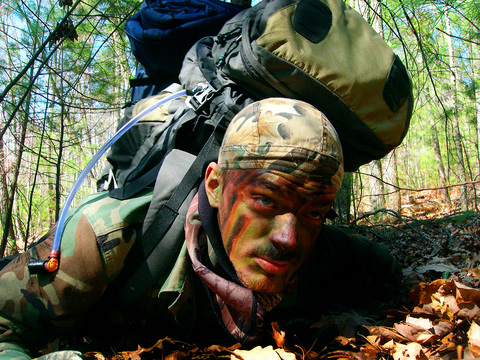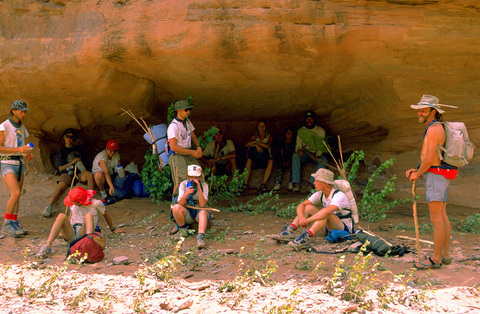"We've just been overrun!" Reggie Bennett, a burly 41-year-old in full-body camouflage, shouted to the four young men behind him. "Our plane is down. We're going to our hole-up site!"
One by one they followed his signal to move forward, crouching behind trees, navigating through the brush, quickening their pace as they heard threats screamed behind them: "I see you, GI! You think you're crafty, GI, but I gonna put you in a cage so you can't get out!" They paused in a dried-up creek bed, Bennett bringing up the rear. "Keep quiet. There are land mines, B-52s and burnt craters all around us," he warned. "This is what a war zone looks -- "
He was interrupted by a ringing cell phone. "You're going to my voice mail," he said, as he checked the incoming number. "I'm evading now!" But he was not getting cell phone reception mid-battle in Fallujah, Iraq. He was teaching his signature Hidden Pursuit escape and evasion class to college seniors who had forgone the wet T-shirt contests and beer bongs of Cancun, Mexico, and Fort Lauderdale, Florida, for the chance to dodge simulated gunshots and explosions at Mountain Shepherd Wilderness Survival School here.

PHOTOS: NY TIMES
Survival and wilderness schools where students learn team-building and leadership skills through building fires and foraging for food have been around for decades, but Bennett's course is one of a handful of new offerings around the country that feature a more extreme kind of challenge. For fees that range from a few hundred US dollars for a two-day class to a few thousand US dollars for adventures that can be four weeks long, the willing can pay to be pursued by make-believe assailants, survive hypothetical plane crashes and hunt down guerrillas.
Survival courses are listed as co-ed but filled mostly by men.
Though it would seem that the desire to dress up in fatigues, cover your face with greasepaint and subsist on Meals Ready to Eat would be the result of some curiosity about or identification with the soldiers in Iraq, those who work in survival schools say the war has little to do with interest in these new classes.

"They want to pretend they're on Lost," Bennett said, referring to the hit drama on ABC about a group of plane crash survivors trying to hack it on a remote island. "They watch those shows and think, `Hey, that looks pretty cool.'"
A former instructor of survival, evasion, resistance and escape in the air force, he started Hidden Pursuit last year after students, retired radiologists and Google executives, asked for a more extreme challenge. Now it is one of his most requested classes.
Michelle Barnes, the vice president for marketing for the Outdoor Industry Association said interest in wilderness and survival schools was piqued when Survivor became a hit show in 2000. (The schools are unaccredited so there is no official count.) Then, she said, participation leveled off, but the success of Lost has reignited it, and schools are creating ever-more-extreme and far-fetched experiences.
"It's consumer marketing," she said. "People watch TV shows that show extreme adventure racing and extreme survival, and so schools are trying to add that twist to their programming."
Huddled under gnarled tree branches in the Virginia backwoods, Bennett and company arrived at a temporary "hole up," where they could apply camouflage makeup. "First assess your medical problems -- take care of massive bleeding," he commanded his troops, who nodded earnestly, even though none appeared to have a scratch. "Now we restore fluids and apply camouflage."
"This is awesome!" exclaimed 23-year-old Garrett Foster, an engineering student.
Soon the men were rubbing green, brown and black stripes over their faces and necks, occasionally pausing so one of them could take a picture.
"This is the funnest part yet," said Justin Hightower, a 23-year-old political science major in Oklahoma, who said he signed up for the class because camping had "become boring."
"What about the firecracker part yesterday?" Bennett asked.
"That was cool, but I want to see you blow up a stump!" said David Brush, another student.
"Yep," Bennett said in his Southern drawl, "we're men doing manly things."
While the purpose of traditional survival school courses has been to instill confidence, teach leadership and team-building and make participants more comfortable in the outdoors, the new classes offer an additional element of fantasy in which students face simulated hardships that they will probably never encounter again. Like surviving a plane crash in the middle of a desert and living off the remains of the nearly obliterated plane for three days.
This particular nightmare-come-to-life will be offered for the first time this summer by the Boulder Outdoor Survival School in Colorado. Josh Bernstein, 35, the company's president and chief executive, said the 72-Hour Survival Rescue Course (the Crash Course) was created "to give an additional X factor" to his traditional offerings. "This class throws a curveball," he said of the scenario in which students are picked up at an airport and then deposited in the middle of a desert or mountain crash scene.
Bernstein said his courses, which tend to be populated not by hard-core adventurers but by everyday professionals, compensate for dull lives. "It's easy for white collar professionals to feel like they haven't faced their ghosts," he said in Midtown Manhattan, where he also has a home. "You want to be able to prove to yourself at some level that you have the inner mettle to get through challenges."
Tom Brown Jr., who runs Tom Brown Jr.'s Tracker School in Waretown, New Jersey, said he wants his students to take what he teaches them back to their urban and suburban lives. This year he added two courses, the Way of the Wolverine, in which students learn wolverine fighting (similar to the martial art ninjitsu); and Urban Scout, which teaches students to apply Native American tracking and evading techniques to urban and suburban settings.
On the third day of the Way of the Wolverine, students are blindfolded as they walk across a narrow log elevated 1.5m above a swimming hole, carrying a tree-branch lance in their hands to fight an opponent. "It all easily translates in the city," Brown said. "If you're attacked in the city you could use the same techniques, like you were a trained boxer."
In his Urban Scout class, Brown uses SWAT training facilities at local police departments to teach students evasion and survival tactics. A few years ago, he said, a couple who took one of his classes used the skills they learned to bust a drug deal in their New Jersey neighborhood. "All they did was camouflage up and hide behind some garbage bins and take pictures," he said, "which they anonymously gave to the police."
Joe Cary, a 36-year-old former bond trader who lives in Los Angeles, took a class at the Tracker School last spring and is enrolled in another this fall. "I had to do it," he said. "It was just male instinct that needed to be fulfilled."
Cary said he now had "a confidence so I know that I'll probably be OK when I walk into a shady place."
Harvey Mansfield, author of the recent book Manliness, and a professor of government at Harvard, said, "When manliness has nothing positive to do it goes to experiences that are contrived." It is odd, he added, that "when we need real fighters all we get is pretend fighters." Young men sign up for extreme survival courses because "they are as embarrassed about patriotism as they are about manliness, and to go into the military may seem too conventional."

On April 26, The Lancet published a letter from two doctors at Taichung-based China Medical University Hospital (CMUH) warning that “Taiwan’s Health Care System is on the Brink of Collapse.” The authors said that “Years of policy inaction and mismanagement of resources have led to the National Health Insurance system operating under unsustainable conditions.” The pushback was immediate. Errors in the paper were quickly identified and publicized, to discredit the authors (the hospital apologized). CNA reported that CMUH said the letter described Taiwan in 2021 as having 62 nurses per 10,000 people, when the correct number was 78 nurses per 10,000

As we live longer, our risk of cognitive impairment is increasing. How can we delay the onset of symptoms? Do we have to give up every indulgence or can small changes make a difference? We asked neurologists for tips on how to keep our brains healthy for life. TAKE CARE OF YOUR HEALTH “All of the sensible things that apply to bodily health apply to brain health,” says Suzanne O’Sullivan, a consultant in neurology at the National Hospital for Neurology and Neurosurgery in London, and the author of The Age of Diagnosis. “When you’re 20, you can get away with absolute

May 5 to May 11 What started out as friction between Taiwanese students at Taichung First High School and a Japanese head cook escalated dramatically over the first two weeks of May 1927. It began on April 30 when the cook’s wife knew that lotus starch used in that night’s dinner had rat feces in it, but failed to inform staff until the meal was already prepared. The students believed that her silence was intentional, and filed a complaint. The school’s Japanese administrators sided with the cook’s family, dismissing the students as troublemakers and clamping down on their freedoms — with

As Donald Trump’s executive order in March led to the shuttering of Voice of America (VOA) — the global broadcaster whose roots date back to the fight against Nazi propaganda — he quickly attracted support from figures not used to aligning themselves with any US administration. Trump had ordered the US Agency for Global Media, the federal agency that funds VOA and other groups promoting independent journalism overseas, to be “eliminated to the maximum extent consistent with applicable law.” The decision suddenly halted programming in 49 languages to more than 425 million people. In Moscow, Margarita Simonyan, the hardline editor-in-chief of the